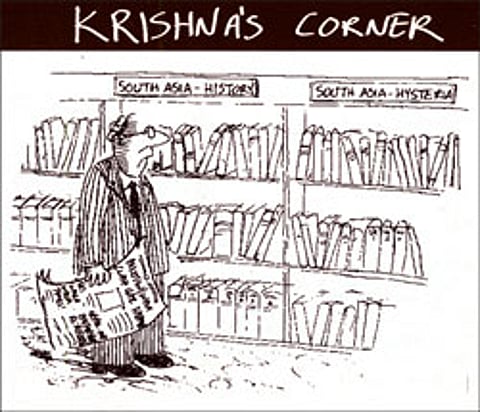The wait for the statesman

| Vintage Himal, 2 |
Walking down busy streets in countries outside of India, I have been questioned by strangers as to whether I knew Urdu, and by unknown persons asking me, "Dada! Aapni ki Bangla bojhen?" Such individuals might have guessed from which part of the world I hailed. That is an identity that will forever be associated with me: that of being a Southasian.
I have never faced such questions in India, where I could be Assamese, Bengali, Gujarati, Maharashtrian or a Hindi-walla. I could be Hindu, Muslim, a Buddhist or Christian, and nobody bothers much about my identity. Language, on the other hand, remains a great source of curiosity among strangers. I was in my teens when I developed a fascination with Urdu, a tongue in which even abuse sounds sweet. During one summer vacation, I asked my father whether he could help me to learn Urdu, as he was equally skilled in both it and Sanskrit. Instead, he took me to our neighbour, whom we all called Hafij Ji, who agreed to teach me after he closed his grocery shop. He told my father that he would sit with me for an hour every evening. I told my newfound guru that I was particularly keen on reading and appreciating the delicacy of Urdu.
There were several open spaces around our house in the village, and in one such space, under a neem tree, Hafij Ji began to tutor me by the light of a lantern. As it happened, this was also the backyard where the elderly male members of our family would sleep during the summertime, where the land sloped slightly towards the neem tree. Hafij Ji would give me lessons, and I would repeat after him, at first struggling with the exact pronunciations. While being tutored, I could see the elders roaming around restlessly, fanning themselves with palm-leaf fans.
On the third evening, my father asked me to sit on the verandah in the front of our house. I pleaded that the breeze in the backyard was soothing, and that it would be very warm on the front verandah. I asked what the problem was with Hafij Ji and I sitting under the neem tree. The mystery was resolved when my father told me that he and the rest of the elders were unable to lie down on their cots, because if they did so their feet would be pointing towards Hafij Ji. This would be disrespectful and could not be allowed. So long as Hafij Ji was teaching me, nobody could sleep. We moved, of course, and thereafter it was I who had to use a palm-leaf fan.
Our countries
Looking back, I find respect for teachers largely missing today. This degeneration has occurred in my own lifetime, and I feel sorry to say that we have failed to pass such values and traditions on to our next generation. But I keep asking myself why, when people such as my father and Hafij Ji were so considerate towards each other, the country was ultimately partitioned. Partition had no impact on our family, but I wonder how those in Pakistan would be teaching the long and illustrious history of the Urdu language. Mir, Ghalib, Zauq, Jaffar, Momin, Sauda, Dagh, Shaad, Hasarat Mohani, Sahir, Hafeez, Faani, Josh, Jigar, Asagar, Mazaz, Allama Iqbal and others were all what many today would call 'Indian'.
Faiz Ahmed Faiz and Quateel Shifai were, possibly, the only exceptions among the stalwarts. How do Bangladeshis feel when told that their national anthem was written by what the contemporary nationalist discourse would term a foreigner? Similarly, how do people in India feel when they are told that their national song, "Saare Jahan se Achchha", was written by someone who preferred to stay in what is today known as Pakistan? Much is said about the aftermath of cricket matches between India and Pakistan, and about the behaviour of some disgruntled fans. All the while, though, we conveniently forget that it was Sunil Gavaskar, the great Indian cricketer, who predicted victory for Pakistan in the New Zealand World Cup. It is a fact that Indians pray for Pakistan's victory in any hockey match in which India is not the rival. Sri Lanka's victory in the World Cup thrilled fans in India as it did in their own country. Once, in Bangladesh, I was asked how I liked the country.
I was taken aback by the query. It occurred to me that I had never felt as though I was out of India. We spoke the same language, ate the same food, cherished the same values, and there was hardly any cultural difference between us. Very reluctantly, I had to say that I liked 'their' country very much. Drawing lines on the ground separates people. One cannot play kabaddi unless a line is drawn between two teams. But lines also create competition. More than the people at large, lines suit the politicians, who wish to have competing groups of people at their command. It is only on rare occasions that politicians, by themselves, move to erase lines; in this region, evidently, one will have to wait for a long time for that to happen. We all await a Southasian statesman
~ Dinesh Mishra is based in Jamshedpur, and is the convenor of the Barh Mukti Abhiyan.

